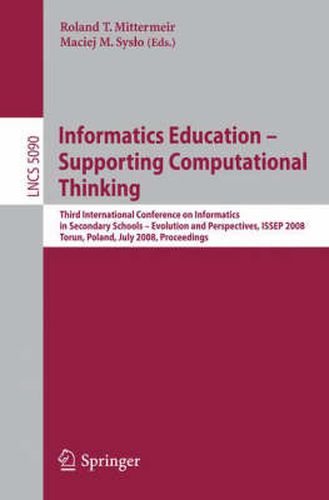Readings Newsletter
Become a Readings Member to make your shopping experience even easier.
Sign in or sign up for free!
You’re not far away from qualifying for FREE standard shipping within Australia
You’ve qualified for FREE standard shipping within Australia
The cart is loading…






This title is printed to order. This book may have been self-published. If so, we cannot guarantee the quality of the content. In the main most books will have gone through the editing process however some may not. We therefore suggest that you be aware of this before ordering this book. If in doubt check either the author or publisher’s details as we are unable to accept any returns unless they are faulty. Please contact us if you have any questions.
Informatics Education - Supporting Computational Thinking contains papers presented at the Third International Conference on Informatics in Secondary Schools - Evolution and Perspective, ISSEP 2008, held in July 2008 in Torun, Poland. As with the proceedings of the two previous ISSEP conferences (2005 in Klag- furt, Austria, and 2006 in Vilnius, Lithuania), the papers presented in this volume address issues of informatics education transcending national boundaries and, the- fore, transcending differences in the various national legislation and organization of the educational system. Observing these issues, one might notice a trend. The p- ceedings of the First ISSEP were termed From Computer Literacy to Informatics F- damentals [1]. There, broad room was given to general education in ICT. The ECDL, the European Computer Driving License, propagated since the late 1990s, had pe- trated school at this time already on a broad scale and teachers, parents, as well as pupils were rather happy with this situation. Teachers had material that had a clear scope, was relatively easy to teach, and especially easy to examine. Parents had the assurance that their children learn modern and relevant stuff, and for kids the c- puter was sufficiently modern so that anything that had to do with computers was c- sidered to be attractive. Moreover, the difficulties of programming marking the early days of informatics education in school seemed no longer relevant. Some colleagues had a more distant vision though.
$9.00 standard shipping within Australia
FREE standard shipping within Australia for orders over $100.00
Express & International shipping calculated at checkout
This title is printed to order. This book may have been self-published. If so, we cannot guarantee the quality of the content. In the main most books will have gone through the editing process however some may not. We therefore suggest that you be aware of this before ordering this book. If in doubt check either the author or publisher’s details as we are unable to accept any returns unless they are faulty. Please contact us if you have any questions.
Informatics Education - Supporting Computational Thinking contains papers presented at the Third International Conference on Informatics in Secondary Schools - Evolution and Perspective, ISSEP 2008, held in July 2008 in Torun, Poland. As with the proceedings of the two previous ISSEP conferences (2005 in Klag- furt, Austria, and 2006 in Vilnius, Lithuania), the papers presented in this volume address issues of informatics education transcending national boundaries and, the- fore, transcending differences in the various national legislation and organization of the educational system. Observing these issues, one might notice a trend. The p- ceedings of the First ISSEP were termed From Computer Literacy to Informatics F- damentals [1]. There, broad room was given to general education in ICT. The ECDL, the European Computer Driving License, propagated since the late 1990s, had pe- trated school at this time already on a broad scale and teachers, parents, as well as pupils were rather happy with this situation. Teachers had material that had a clear scope, was relatively easy to teach, and especially easy to examine. Parents had the assurance that their children learn modern and relevant stuff, and for kids the c- puter was sufficiently modern so that anything that had to do with computers was c- sidered to be attractive. Moreover, the difficulties of programming marking the early days of informatics education in school seemed no longer relevant. Some colleagues had a more distant vision though.